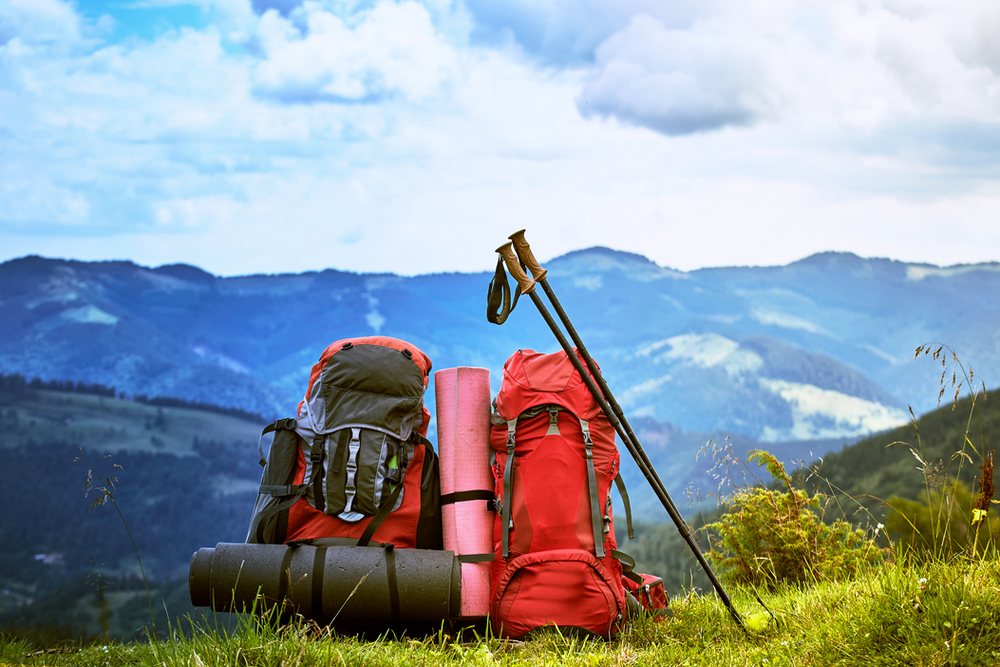Conquer Europe on a shoestring! This ultimate budget backpacking guide reveals money-saving hacks for accommodation, transportation, food, activities, and more. Explore Europe without breaking the bank! Learn how to find cheap flights, free walking tours, and delicious street eats. Discover the best apps to learn essential phrases in various European languages. Pack your bags for an unforgettable adventure!
Europe, with its rich tapestry of history, captivating cultures, and stunning landscapes, beckons budget travelers from all corners of the globe. But isn’t Europe expensive, you ask? Absolutely not! With some clever planning and these savvy hacks, you can explore Europe on a shoestring budget and have an unforgettable adventure.
Planning Your European Backpacking Extravaganza:
-
Shoulder Seasons: Avoid peak tourist season (June-August) when prices skyrocket. Shoulder seasons (April-May, September-October) offer pleasant weather, fewer crowds, and often cheaper flights and accommodation.
-
Destination Choices: While Western Europe tends to be pricier, Eastern Europe offers a treasure trove of cultural experiences on a budget. Consider destinations like:
- Poland:
- Best Time to Visit: May-September for pleasant weather and outdoor activities; December for Christmas markets (potentially pricier).
- Places to Visit: Explore the historic city of Krakow, delve into the dark history of Auschwitz, or wander the charming streets of Warsaw.
- Czech Republic:
- Best Time to Visit: April-May or September-October for comfortable temperatures and fewer crowds; December for Christmas markets.
- Places to Visit: Be mesmerized by the architectural beauty of Prague, soak in the natural wonders of Bohemian Switzerland National Park, or sample delicious Czech beers in a local pub.
- Hungary:
- Best Time to Visit: Spring (April-May) or autumn (September-October) for comfortable weather; December for festive Christmas markets.
- Places to Visit: Immerse yourself in the thermal baths of Budapest, explore the grandiose Buda Castle, or marvel at the beauty of Lake Balaton.
- Balkans:
- Best Time to Visit: Spring (April-May) or autumn (September-October) for comfortable temperatures for outdoor activities; avoid July and August due to potential heat waves.
- Places to Visit: Hike through the breathtaking Montenegrin mountains, discover the Ottoman history of Sarajevo, or relax on the stunning beaches of Croatia.
- Poland:
-
Travel Slowly: Resist the urge to cram too many countries into your itinerary. Focus on a specific region to save on transportation costs and truly immerse yourself in the local culture.
-
Workation Options: Extend your trip by participating in work exchange programs (WWOOFing) or volunteering opportunities. You’ll gain valuable experiences and potentially free accommodation and meals.
Accommodation on a Budget:
- Hostels: Your best friend on a budget backpacking trip. Hostels offer dorm beds for a fraction of the price of a hotel room, and many have common areas to meet fellow travelers and share experiences. Look for hostels with included breakfast to save even more. Here are some popular, budget-friendly hostel chains in Europe:
- Generator Hostels: https://generatorhostels.com/
- St Christopher’s
- A&O Hostels: https://www.aohostels.com/
- Couchsurfing: This hospitality network allows you to connect with locals who offer a free couch or spare room in their homes. It’s a fantastic way to experience local culture firsthand. Consider using websites like Couchsurfing: https://www.couchsurfing.com/ to connect with potential hosts.
- Camping: If you enjoy the outdoors, consider camping. Europe has numerous campsites offering affordable pitches. This option allows for a more nature-immersed experience. Look for campsites on websites like Camping.info: [invalid URL removed] or ACSI Camping: https://www.acsi.eu/en/.
- House-sitting: Websites like TrustedHousesitters: https://www.trustedhousesitters.com/ and House Sit Match: https://www.housesitmatch.com/ connect homeowners needing house or pet sitters with responsible travelers. You get free accommodation in exchange for watching over the property.
Smart Transportation Choices:
- Intercity Buses: Buses are often the cheapest way to travel between major European cities. Consider overnight buses to save on accommodation costs. Research budget-friendly bus companies like Flixbus https://www.flixbus.com/ or Eurolines https://eurolines.eu/ for comfortable and extensive route options.
- Trains: While sometimes pricier than buses, trains offer a more comfortable and scenic travel experience. Look for regional train passes or promotional fares for budget-conscious options. Consider Eurail passes https://www.eurail.com/ if you plan on extensive train travel across multiple countries. These passes can be a cost-effective option, especially for longer journeys, but be sure to research and compare prices based on your specific itinerary.
- Ridesharing: Apps like Blablacar https://www.blablacar.com/ connect travelers with drivers offering carpool rides between destinations. It can be a cost-effective and social way to get around, especially for reaching smaller towns or villages not well-served by public transportation. Remember to prioritize safety and exercise caution when choosing this option.
- Hitchhiking: While not for everyone, hitchhiking is a time-tested (and potentially risky) way to get around for free. Always prioritize safety and exercise common sense if you choose this option. Research hitchhiking safety tips specific to the countries you’ll be visiting and never hitchhike alone.
Additional Tips:
- Consider purchasing a multi-modal travel pass, which can combine train, bus, and ferry travel within a specific region, offering flexibility and potentially reducing costs compared to buying individual tickets.
- Be open to alternative travel routes. Sometimes, flying into a smaller airport or taking a slightly longer route with a connection can be significantly cheaper than the most direct option.
- Plan your travel days around public transportation schedules to avoid expensive taxi fares, especially late at night.
-
Banking and Cash:
- Inform Your Bank: Before your trip, notify your bank that you’ll be using your debit card abroad to avoid any issues with international transactions.
- Debit Cards: The most convenient option for withdrawing cash from ATMs. Look for cards with no foreign transaction fees to avoid unnecessary charges. Consider opening a travel-friendly bank account with perks like fee-free ATM withdrawals abroad.
- Cash Withdrawal: While debit cards are widely accepted, it’s wise to carry some cash for smaller purchases or situations where cards aren’t accepted. Withdraw cash from ATMs sparingly, as fees can add up. Research daily withdrawal limits to plan accordingly.
Finding Flights on a Budget:
- Budget Airlines: Europe has a robust network of budget airlines like Ryanair, Wizz Air, and EasyJet, offering cheap flights between major cities. Be flexible with your travel dates and consider flying into smaller airports for potentially lower fares.
- Flight Search Engines: Utilize flight search engines like Google Flights https://www.google.com/flights, Skyscanner https://www.skyscanner.com/], or Kayak https://www.kayak.com/ to compare prices across different airlines and find the best deals. Consider flying into budget-friendly destinations and traveling overland from there.
- Shoulder Seasons: Remember, shoulder seasons (April-May, September-October) often have cheaper flights compared to peak tourist season.
Keeping Food Costs Low:
- Self-catering: Hostels and campsites often have shared kitchens, allowing you to prepare your own meals. Stock up on groceries at local markets for budget-friendly options. Explore local farmers markets for fresh produce and unique finds.
- Street Food: Skip expensive restaurants and indulge in delicious and affordable street food. Falafel wraps in Berlin, Döner kebabs in Istanbul, or fresh baguettes with cheese in Paris are all budget-friendly and tasty choices.
- Picnics: Pack lunches for exploring cities or day trips. Purchase fresh bread, cheese, fruits, and vegetables from local markets for a delightful and affordable picnic experience.
- Grocery Store Meals: Many European grocery stores offer pre-made salads, sandwiches, and hot meals that are perfect for quick and inexpensive lunches on the go.
Saving on Activities and Sightseeing:
- Free Walking Tours: Most major European cities offer free walking tours led by passionate locals. These tours provide historical insights and a great way to get oriented. Consider tipping your guide if you enjoyed the tour.
- Museum Discounts: Many museums offer discounts for students, seniors, or on specific days of the week. Take advantage of these opportunities to save on entrance fees. Some museums even have free admission days!
- Explore the Outdoors: Europe boasts stunning natural landscapes. Hike through national parks, explore hidden waterfalls, or simply relax in a beautiful public garden. Many outdoor activities are free or have minimal entrance fees.
- City Passes: If you plan on visiting multiple museums and attractions in a particular city, consider purchasing a city pass. These passes often offer discounted entry and can be a cost-effective option, especially for popular tourist destinations.
Staying Connected:
- Free Wi-Fi: Many European cafes, restaurants, and public spaces offer free Wi-Fi. Take advantage of this to stay connected and avoid expensive roaming charges. Consider purchasing a local SIM card with a data plan for extended stays, allowing you to make calls and use the internet without relying on Wi-Fi hotspots.
- Communication Apps: Utilize free communication apps like WhatsApp or Viber to stay in touch with loved ones back home. These apps allow for free voice and video calls over Wi-Fi connections.
Embrace the Adventure:
Backpacking Europe on a budget is an enriching experience that will broaden your horizons and leave you with lasting memories. Be prepared to adapt, embrace the unexpected, and immerse yourself in the local cultures. With a little planning and these savvy tips, you can conquer Europe without breaking the bank!
Bonus Tips:
-
Learn a few basic phrases in the local language. A little effort goes a long way in showing respect and can enhance your interactions with locals. Here are some helpful resources and popular apps by country to get you started:
- Western Europe:
- France: Duolingo, Memrise, Busuu https://www.busuu.com/] (focus on learning essential phrases like “Bonjour” (Hello), “Merci” (Thank you), “Parlez-vous anglais?” (Do you speak English?)
- Spain: Duolingo, Memrise, Babbel https://babbel.com/] (learn greetings like “Hola” (Hello), “Gracias” (Thank you), “¿Hablas inglés?” (Do you speak English?)
- Germany: Duolingo, Memrise, Lingodeer https://www.lingodeer.com/] (master basic phrases like “Hallo” (Hello), “Danke” (Thank you), “Sprechen Sie Englisch?” (Do you speak English?)
- Eastern Europe:
- Poland: Duolingo, Memrise, Drops https://languagedrops.com/] (pick up greetings like “Dzień dobry” (Hello), “Dziękuję” (Thank you), “Mówisz po angielsku?” (Do you speak English?)
- Czech Republic: Duolingo, Memrise, HelloTalk [[invalid URL removed]] (learn some Czech phrases like “Dobrý den” (Hello), “Děkuji” (Thank you), “Mluvíte anglicky?” (Do you speak English?)
- Hungary: Duolingo, Memrise (Hungarian can be more challenging, but these apps can give you a foundation. Consider hiring a local tutor for more in-depth learning)
- Balkans:
- Croatia: Many locals speak English in tourist areas, but learning some basic Croatian like “Bok” (Hello), “Hvala” (Thank you), “Govorite li engleski?” (Do you speak English?) can be appreciated. Use Duolingo or Memrise.
- Montenegro: Montenegrin is similar to Serbian. Lingodeer or Babbel can be helpful for learning greetings like “Zdravo” (Hello), “Hvala” (Thank you), “Govorite li engleski?” (Do you speak English?)
- Western Europe:
-
Pack light. Europe has excellent laundry facilities, so there’s no need to overpack.
-
Bring a reusable water bottle. Tap water is safe to drink in most European countries, so you can avoid the cost of bottled water.
-
Travel with an open mind and a sense of adventure. Europe is a treasure trove of cultural experiences waiting to be discovered. Embrace the unexpected and enjoy the journey!
By following these tips and utilizing your resourcefulness, you can have an unforgettable and budget-friendly backpacking adventure in Europe. Now get out there and explore!





